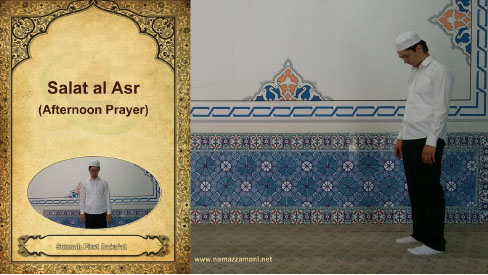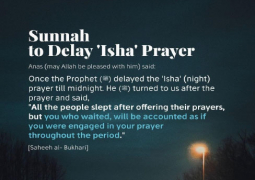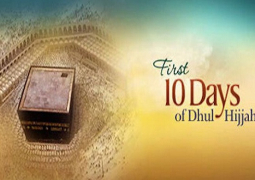
This prayer begins in the afternoon when the shadow of an object is of the same length as the object itself, and continues until the sun sets. Abu Hurairah reported that the Prophet, upon whom be peace, said, “Whoever catches one rak’ah of the afternoon prayer before the sun sets and then prays the remainder of the prayer after the sun has set has not missed the afternoon prayer.”
The best and most preferred time to pray the afternoon prayer ends when the sun becomes yellowish on the horizon. This is implied by the preceding hadith of Jabir and ‘Abdullah ibn ‘Umar. To delay the prayer until the sun becomes yellowish, although it is permissible, is greatly disliked, unless there is some need to do so. Anas reported that he heard the Prophet, upon whom be peace, say, “The following is the prayer of the hypocrite: he waits until the sun is between the horns of Satan, then he gets up and prays four quick rak’ah, and he does not remember Allah therein save a little bit.” (Related by “the group,” except for al-Bukhari and Ibn Majah.)
Says an-Nawawi in his commentary on Sahih Muslim, “Our companions (the Shafiyyah) hold that the afternoon prayer time can be divided into five categories: the most virtuous time, the preferred time, the allowable time in which there is no disliked aspect, the allowable time that contains some aspect of dislike, and the time that is due to some excuse or necessity. The most virtuous time is at the beginning of the permissible time. The preferred time is until the shadow of an object is twice the length of the object itself. The permissible time without any aspect of dislike is from the time the sun becomes yellowish. The permissible time with some aspect of dislike is from the time the sun becomes yellowish until the setting of the sun. The time of excuse or necessity begins, in fact, at the time of the noon prayer for one who is to combine the noon and afternoon prayers, due to travelling or rain. If the afternoon prayer is made during any of those times, it has been fulfilled properly. If all of those times pass and the sun has set, then one must make up the prayer.”
On a cloudy day, it should be prayed earlier in its time. Buraidah al-Aslami reported, “We were with the Messenger of Allah, upon whom be peace, during a battle and he said, “Hasten in praying on a cloudy day, for one who misses the afternoon prayer has destroyed all of his works.” (Related by Ahmad and Ibn Majah.)
Of the subject, Ibn al-Qayyim says, “Leaving the prayer is of two types: leaving it completely and never praying it (which destroys all of one’s deeds), and leaving it during a particular day, which destroys all of the deeds of that day.”
The Afternoon Prayer is the “Mid-most” Prayer
Says Allah in the Qur’an, “Observe and guard the prayers and the mid-most prayer, and stand with total submission to Allah. Authentic hadith have made it clear that the afternoon prayers is the “midmost” prayer.
‘Ali reported that the Prophet, upon whom be peace, said on the day of al-Ahzab (the battle of the clans), “May Allah fill their graves and houses with fire, as they kept us preoccupied from the “midmost” prayer until the sun had set.” (Related by al-Bukhari and Muslim. Muslim, Abu Dawud and Ahmad have “the afternoon prayer” inserted after “the mid-most” prayer.”)
Explaining the context of this hadith, Ibn Mas’ud said, “The idol-worshippers kept the Prophet from the afternoon prayer until the sun had become reddish and yellowish. The Messenger of Allah said, “They kept us preoccupied from the “mid-most” prayer, the afternoon prayer--may Allah fill their bellies and graves with fire.”’ (Related by Ahmad, Muslim, and Ibn Majah.)
The Time for the Sunset Prayer (Maghrib)
The time for the sunset prayer begins with the disappearance of the sun and lasts until the red twilight ends. ‘Abdullah ibn ‘Amr reported that the Prophet, upon whom be peace, said, “The time for the sunset prayer is when the sun has disappeared and the twilight has not gone.” (Related by Muslim.) Abu Musa related that a man asked the Prophet about the prayer times, and he mentioned the hadith which states that he ordered the sunset prayer when the sun had set and, on the next day, he prayed it when the red twilight was ending and he said, “The time (for the sunset prayer) is between these two times.”
An-Nawawi says in his commentary on Sahih Muslim, “It is the opinion of the research scholars of our companions (the Shaf’iyyah) that ... it is allowed to delay it as long as it is twilight. It is allowed to begin the prayer at any time during that period. There is no sin in delaying it from its earliest time.” Concerning the earlier quoted hadith in which Gabriel led the prayers and prayed the sunset prayer at the same time on both days, it only shows that it is greatly preferred to perform the sunset prayer as early as possible. This point is made clear by some other hadith:
As-Sa’ib ibn Yazid related that the Messenger of Allah, upon whom be peace, said, “My nation will always be along the natural path as long as they pray the sunset prayer before the stars appear.” (Related by Ahmad and at-Tabarani).
In Ahmad’s Musnad it is related from Abu Ayyub al-Ansari that the Prophet said, “Pray the sunset prayer when the fasting person breaks his fast and when the stars are about to appear.”
In Sahih Muslim it is related from Rafa’ ibn Khadeej that “We prayed the sunset prayer with the Messenger of Allah, and one of us would leave (afterwards) and would still be able to see where he shot his arrow, (because there was still so much light left in the sky).”
In Sahih Muslim it is recorded from Salamah ibn al-Aku’ that the Messenger of Allah, upon whom be peace, would pray the sunset prayer when the sun had set and disappeared (behind the horizon).
The Time of the Night Prayer (‘Isha)
This prayer begins when the red twilight disappears and continues up to half of the night. Reported ‘Aishah, “They used to pray the night prayer between the disappearance of the twilight and the final third of the night’s beginning.” (Related by al-Bukhari.) Abu Hurairah reported that the Messenger of Allah, upon whom be peace, said, “If it were not to be a hardship upon my nation, I would order them to delay the night prayer until a third or a half of the night had passed.” (Related by Ahmad, Ibn Majah and at-Tirmizhi, who said it is sahih.) Reported Abu Sa’eed, “Once, we waited for the Messenger of Allah to lead the night prayer until half the night had passed, at which time he came and prayed with us. He said, ‘Stay in your places of sitting while the people have gone to their places of lying down (for sleep), for you are in prayer as long as you are waiting for the prayer. If it were not for the weakness of the weak, the illness of the ill and the need of those who have needs, I would have delayed the time of this prayer to a half of the night.”
As to the authenticity of this report, it is recorded by Ahmad, Abu Dawud, Ibn Majah, an-Nasa’i and Ibn Khuzaimah. Its chain is sahih). The hadith describes the best time to pray. As for the allowable time and the time due to need, it lasts until dawn. Abu Qatadah reported that the Messenger of Allah, upon whom be peace, said, “There is no negligence in sleeping, but the negligence lies in not praying a prayer until the time of the next prayer has come.” (Related by Muslim.) This hadith shows that the time of every prayer continues until the beginning of the time for the next prayer, except for the morning prayer, as all scholars agree that its time lasts only until sunrise.
To be continued





